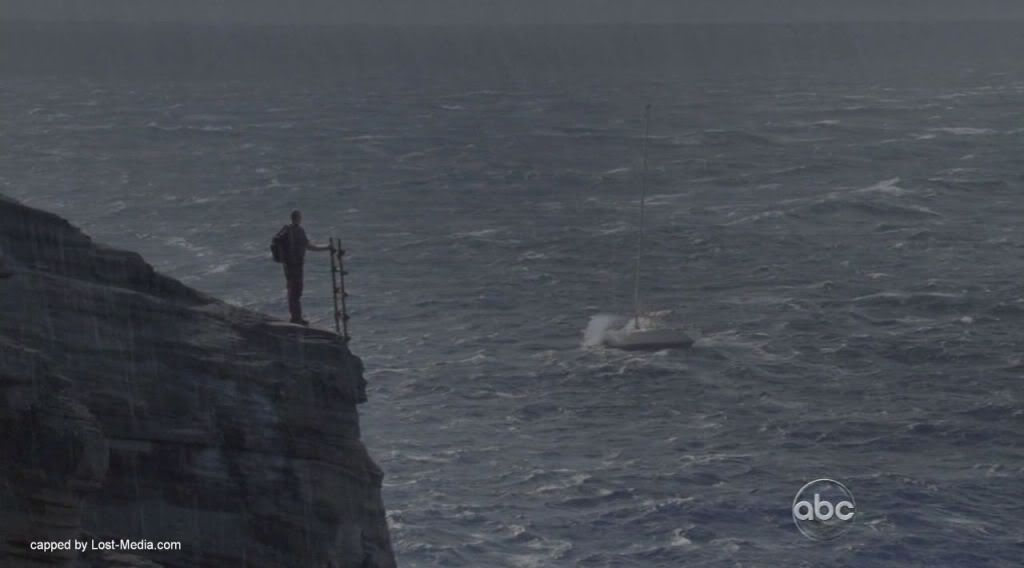Last Lost: "The End"
by Ryland Walker Knight

Granted, a six-season series premised on mystery could never deliver a satisfying "solution" to its "riddles." Hell, a lot of Chandler stories make you feel hollow. But the difference there, I suppose, isn't the investment versus reward thing but the kind of nuance and general philosophical arguments made by such endings, and such style. The MacGuffin as a way to get around mystery's meaning and all that. Which is why a lot of the riffing on Lost seemed excusable: in the interest of entertainment and tickling your brain, and dollars in the bank. However, artistically, you can't ask for dumber. Tug-o-war is, as most people will learn at one point, only fun for one group of people in the end.
The only excusable rationale behind the ending of Lost puts that whole "sideways" story—or "primed" as I've called it through this run—inside Jack's skull as a real flash before his eyes, before they close for good. However, everything about that story line aimed to show these characters as the characters they were on the island. This presumes a few stupid things we're supposed to simply believe in because the second-to-last scene was set in a church. For example, given the waves of relief after those flashes, it would appear that these characters are all just waiting to die while Jack hugs his dad; by extension, everything does revolve around Jack in the way he believed. That's not exactly bad writing, but here it's unchecked hubris. In fact, it's celebrated as finding some faith. And, then, all the other people are only there because the only thing that mattered in their lives was the island or what happened on the island. That is, instead of making the final escape matter the most—Kate and Sawyer and Claire can shack up in an unholy trio of bad vibes and worse life choices!—and where the fuck does Richard go from here?!—we're supposed to find Jack's "full circle" endgame poignant. Put otherwise, it's cynical and narrow-minded and not about living life.
I don't care about the implausibilities of everything. In fact, I dig the fantastic the most. The imagination is what drove the show on, and kept its fans hooked; the tease of the possible. We've all written our own branching fan fiction already with our guesses and our gchats and our weekly recaps. Lost's lasting legacy won't be that it united a record amount of viewers but that it knew how to play the television medium perfectly. It maximized sentimentality, action and wallets with a few decent jokes and a ton of bad ones. And I'd be fine with it as a goof if it didn't take itself so seriously. All this talk about "letting go" in the final season is clearly aimed at the audience, that they'll/we'll be okay without these characters, but basically it's the bullshit way out of the same predicament any great show faces. This is what makes The Sopranos so brilliant, still, because I can remember that confusion and then thrill when the screen went black and we thought Cuyler's cable had gone out but in a minute realized we'd just gotten duped into expecting a resolution we'd never feel satisfied with. I don't care if Tony was killed or not, which is why giving these characters tidy death fantasies on Lost is such an affront. Some of the best moments of Lost were the unexpected deaths. That death was never fair, even when it was expected.
Call me morbid, but I'm terrified of dying. But I think about it a lot. I heard Stanley Cavell say once that any philosopher takes up philosophy because his or her life has been shattered in some way and s/he wants to reckon how, not why. If you take a look at Lost as you should any text that matters (it clearly struck a chord with plenty, evaluations of quality aside), you'll see a lot of avenues for thoughtful engagement. But, as the finale proved, all roads converge again (likely in a pile-up). The branches I got so jazzed about at the start of this season were more like tributaries. And we know that water runs down hill, toward the ocean. Unless, of course, you're on a crazy island full of magnets and mystic shit and clackety smoke. There, the water runs to a source, a light source, a source of light—and that light's absolving in the right circumstances. That's what I'll take away: that they made it about light, and opening your eyes. I'm not exactly satisfied, but I'm also done. I'll take my flight from this fancy free dream machine. I'm sure I'll talk about it a bit more here and there but, really, I don't need to think about Lost again. Hell, I'd rather watch a Sopranos, or a Seinfeld, and laugh my butts off. Those were shows that knew how to quit and keep a carrot dangling. The secret, I'm certain, is in the comedy. Picking up pieces or sweeping junk away, you gotta love this life. Or at least laugh at it.





I didn't actively dislike "The End," but I think that may have been because my opinion of the show dropped quite a lot as this season progressed*, so my bar wasn't set very high. It's definitely unsatisfactory on a whole bunch of levels. I'm OK with leaving threads dangling to spark debate (in fact I'm beyond OK with it, as most of my favorite finales (Twin Peaks, The Prisoner) tend to make things even more confusing) but I can't imagine anybody having an interesting discussion or even thinking an interesting thought about anything this show left up in the air. It's a very hackish conception of ambiguity, that it's artistically valid, and a surefire means to attain cult immortality, to withhold answers without bothering to make the withholding resonate (ditto all the crude symmetry).
ReplyDeleteWhat really torpedoed the endgame was the idea that it had always been about the characters. Another show (with which LOST shared an almost unseemly amount of plot points), Battlestar Galactica, ended by taking a similar route out, and with an equal degree of religiosity. But there, the characters weren't just plot puppets. That show at its best was about how all the mindgames and wartime trauma affected the characters. Its ending was clunky and earned some of all the fanboy ire it got, but the writers at least had the right idea. LOST at its best was about What, not Who.
*Not just because this season wasn't very good, but also because I've been watching Buffy the Vampire Slayer, which either Cuse or Lindelof claim as a major inspiration, and which shames LOST in every category except FX and production values. There's a show that ran the whole tonal gamut, embodied rather than merely talked about its themes, knew the difference between pathos and bathos, and evinced a real love for and (sometimes over-)attention to language.
Thanks for the comment, JF. One of the things I chatted about with a friend earlier today was the idea that people don't necessarily understand why they're watching certain tv shows, or what tv can really offer. I honestly think _Lost_ is/was popular because it's got _just_ enough pointing at other stuff, including the audience, that it placates curiosity as much as sparks it.
ReplyDeleteI've definitely heard praises sung for both those shows. Dunno if I'll get around to them but maybe. I'm more interested in exhausting _30 Rock_ right now.